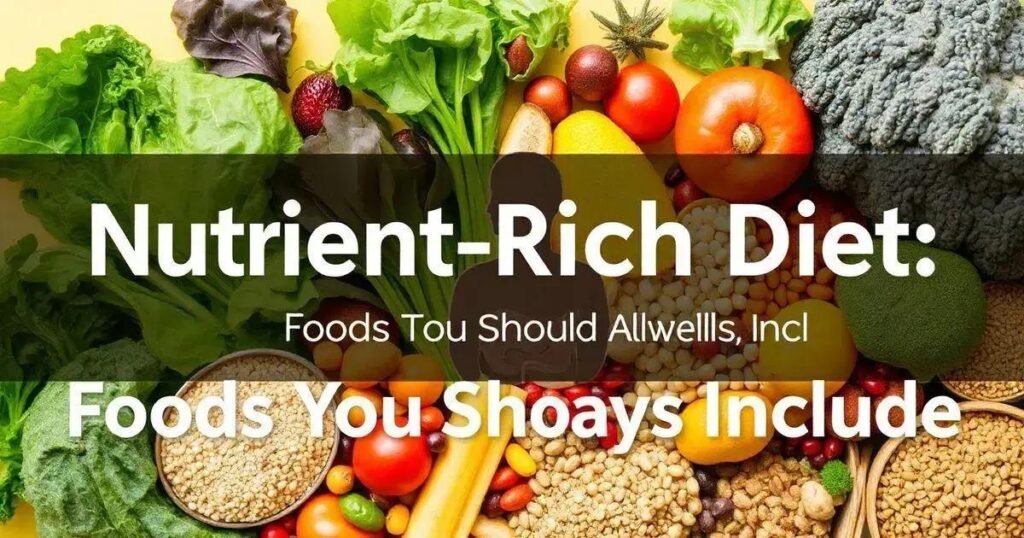Are you looking for a way to boost your energy levels, improve your overall health, and reduce your risk of chronic diseases? A Nutrient-dense diet may be the answer.
By focusing on whole, unprocessed foods and avoiding sugary and processed snacks, you can provide your body with the nutrients it needs to function at its best.
In this article, we’ll explore the benefits of a nutrient-dense diet and provide tips for incorporating more whole foods into your daily routine.
Benefits of a Nutrient-Dense Diet
A nutrient-dense diet provides numerous benefits for overall health and wellbeing. By consuming a variety of whole, unprocessed foods, you can boost your energy levels, support weight management, and reduce your risk of chronic diseases.
A nutrient-dense diet is also beneficial for mental health, as it provides essential nutrients for the production of neurotransmitters that regulate mood and cognitive function.
Additionally, a diet rich in vitamins, minerals, and antioxidants can help to protect against chronic diseases, such as heart disease, diabetes, and certain types of cancer.
By incorporating nutrient-dense foods into your diet, you can also support healthy digestion, reduce inflammation, and promote optimal gut health.
A well-planned nutrient-dense diet is a key component of a healthy lifestyle, and can have a significant impact on both physical and mental health.
Understanding Nutrient-Dense Foods

A nutrient-dense diet provides numerous benefits for overall health and wellbeing. By consuming a variety of whole, unprocessed foods, you can boost your energy levels, support weight management, and reduce your risk of chronic diseases. A nutrient-dense diet is also beneficial for mental health, as it provides essential nutrients for the production of neurotransmitters that regulate mood and cognitive function.
Nutrient-dense foods are those that provide a high amount of essential vitamins, minerals, and antioxidants while being low in calories and added sugars. These foods are rich in fiber, protein, and healthy fats, which can help to support healthy digestion and satiety. Examples of nutrient-dense foods include leafy greens, berries, nuts, and fatty fish. By incorporating these foods into your diet, you can provide your body with the nutrients it needs to function at its best.
Incorporating more nutrient-dense foods into your diet can be simple and easy. Start by making small changes, such as switching to whole grain bread or adding spinach to your omelette. You can also try meal prepping or planning your meals around nutrient-dense foods. Additionally, consider meal delivery services or online recipe resources to help you get started. Remember to always read food labels and choose products that are low in added sugars and artificial ingredients.
Nutrient-dense foods play a crucial role in maintaining a healthy gut. Foods high in fiber, such as fruits, vegetables, and whole grains, can help to support the growth of beneficial gut bacteria. Additionally, fermented foods like yogurt, kefir, and sauerkraut contain probiotics that can help to promote a healthy gut microbiome. Omega-3 fatty acids found in fatty fish and flaxseeds can also help to reduce inflammation in the gut and promote overall gut health.
Nutrient-dense foods are essential for a strong immune system. Vitamin C-rich foods like citrus fruits, berries, and leafy greens can help to support the production of white blood cells, which fight off infections. Omega-3 fatty acids found in fatty fish and flaxseeds can also help to reduce inflammation and promote immune function. Probiotics found in fermented foods like yogurt and kefir can help to support the growth of beneficial gut bacteria, which is essential for a healthy immune system.
Tips for Incorporating More Nutrient-Dense Foods
One of the most effective ways to incorporate more nutrient-dense foods into your diet is to start with small changes. Try substituting whole grain bread for white bread, or adding spinach to your omelette.
You can also try meal prepping or planning your meals around nutrient-dense foods. Additionally, consider meal delivery services or online recipe resources to help you get started.
Remember to always read food labels and choose products that are low in added sugars and artificial ingredients. Make a conscious effort to include a variety of colors on your plate to ensure you are getting a range of essential nutrients.
By making these simple changes, you can significantly increase the nutrient density of your diet and support overall health and wellbeing.
Nutrient-Dense Foods for a Healthy Gut

Nutrient-dense foods play a crucial role in maintaining a healthy gut. Foods high in fiber, such as fruits, vegetables, and whole grains, can help to support the growth of beneficial gut bacteria.
Additionally, fermented foods like yogurt, kefir, and sauerkraut contain probiotics that can help to promote a healthy gut microbiome. Omega-3 fatty acids found in fatty fish and flaxseeds can also help to reduce inflammation in the gut and promote overall gut health.
A balanced diet rich in nutrient-dense foods can help to support a healthy gut by promoting the growth of beneficial bacteria and reducing the risk of gut disorders. By incorporating these foods into your diet, you can support overall health and wellbeing.
Nutrient-Dense Foods for a Strong Immune System
Nutrient-dense foods play a crucial role in supporting a strong immune system.
Vitamin C-rich foods like citrus fruits, berries, and leafy greens can help to support the production of white blood cells, which fight off infections.
Omega-3 fatty acids found in fatty fish and flaxseeds can also help to reduce inflammation and promote immune function.
Probiotics found in fermented foods like yogurt and kefir can help to support the growth of beneficial gut bacteria, which is essential for a strong immune system.
A diet rich in nutrient-dense foods can help to support a strong immune system by providing essential vitamins, minerals, and antioxidants.
By incorporating these foods into your diet, you can support overall health and wellbeing.
Conclusion: Nourish Your Body with a Nutrient-Dense Diet
 Conteúdo não disponível
Conteúdo não disponível
Frequently Asked Questions – FAQs about Nutrient-Dense Diet
What are the benefits of a nutrient-dense diet?
A nutrient-dense diet provides numerous benefits for overall health and wellbeing. It can help to boost energy levels, support weight management, and reduce the risk of chronic diseases.
How can I incorporate more nutrient-dense foods into my diet?
You can incorporate more nutrient-dense foods into your diet by making small changes, such as switching to whole grain bread or adding spinach to your omelette. You can also try meal prepping or planning your meals around nutrient-dense foods.
What are some examples of nutrient-dense foods?
Examples of nutrient-dense foods include leafy greens, berries, nuts, and fatty fish. These foods are rich in vitamins, minerals, and antioxidants.
How can a nutrient-dense diet support a healthy gut?
A nutrient-dense diet can support a healthy gut by promoting the growth of beneficial gut bacteria and reducing inflammation.
What are some tips for maintaining a nutrient-dense diet?
Some tips for maintaining a nutrient-dense diet include reading food labels, choosing whole foods over processed foods, and cooking at home using fresh ingredients.
Can a nutrient-dense diet support a strong immune system?
Yes, a nutrient-dense diet can support a strong immune system by providing essential vitamins, minerals, and antioxidants that help to boost the production of white blood cells and reduce inflammation.



